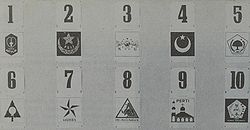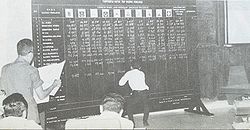
Indonesian legislative election, 1971
Encyclopedia
Indonesia
's second legislative election, and the first under the New Order
regime, was held on July 3, 1971. There were 10 participants; 9 political parties and the "functional group" Golkar
.
 Following the Transition to the New Order from 1965–1967, the army-backed New Order
Following the Transition to the New Order from 1965–1967, the army-backed New Order
regime announced that the Golkar
organization would be its political vehicle. The regime stressed that Golkar (meaning "functional group") was not a political party. In order to give General Ali Murtopo
time to turn Golkar into an organization fit to command a majority in the legislature, the general election originally planned for no later than July 5, 1968 was postponed to no later than July 5 1971.
After a time with no word from the government concerning the forthcoming election, on October 22, 1968, the Sinar Harapan daily reported a statement by President Suharto to the effect that the government had begun to take the necessary steps to organize the poll. A General Election Board was established in mid-1969 headed by Interior Minister Amirmachmud
. On September 23, 1970, the ballot paper numbers and electoral symbols for the 10 election participants were announced.
 In order to weaken possible rivals to Golkar, the government manipulated the top two parties from the 1955 election
In order to weaken possible rivals to Golkar, the government manipulated the top two parties from the 1955 election
, the Indonesian National Party
and Parmusi (the successor to Masjumi
following that party's banning in 1960) such that they lost credibility in the eyes of voters. Given that the party that had come fourth, the Indonesian Communist Party
, had been banned in the aftermath of the 30 September Movement
coup attempt in 1965, that left only the Nahdatul Ulama
as a major rival.
Away from the political parties, civil servants were effectively obliged to vote Golkar and regional administrators were required to fulfill "quotas" of Golkar votes.
The system of allocating seats was changed from that of the 1955 election to reduce the number of parties winning seats in the legislature. All seats were to be allocated in the regional electoral districts, rather than being divided up based on national results.
Indonesia
Indonesia , officially the Republic of Indonesia , is a country in Southeast Asia and Oceania. Indonesia is an archipelago comprising approximately 13,000 islands. It has 33 provinces with over 238 million people, and is the world's fourth most populous country. Indonesia is a republic, with an...
's second legislative election, and the first under the New Order
New Order (Indonesia)
The New Order is the term coined by former Indonesian President Suharto to characterize his regime as he came to power in 1966. Suharto used this term to contrast his rule with that of his predecessor, Sukarno...
regime, was held on July 3, 1971. There were 10 participants; 9 political parties and the "functional group" Golkar
Golkar
The Party of the Functional Groups is a political party in Indonesia. It is also known as Sekber Golkar . It was the ruling party during Suharto's regime...
.
Background

New Order
New Order are an English rock band formed in 1980 by Bernard Sumner , Peter Hook and Stephen Morris...
regime announced that the Golkar
Golkar
The Party of the Functional Groups is a political party in Indonesia. It is also known as Sekber Golkar . It was the ruling party during Suharto's regime...
organization would be its political vehicle. The regime stressed that Golkar (meaning "functional group") was not a political party. In order to give General Ali Murtopo
Ali Murtopo
Ali Murtopo was a prominent Indonesian general and political figure during the first half of General Suharto's New Order regime.-Early life:...
time to turn Golkar into an organization fit to command a majority in the legislature, the general election originally planned for no later than July 5, 1968 was postponed to no later than July 5 1971.
After a time with no word from the government concerning the forthcoming election, on October 22, 1968, the Sinar Harapan daily reported a statement by President Suharto to the effect that the government had begun to take the necessary steps to organize the poll. A General Election Board was established in mid-1969 headed by Interior Minister Amirmachmud
Amirmachmud
Amirmachmud was an Indonesian Military General who was an eyewitness to the signing of the Supersemar document transferring power from President Sukarno to General Suharto.-Early life:...
. On September 23, 1970, the ballot paper numbers and electoral symbols for the 10 election participants were announced.
Government Manipulation

Indonesian legislative election, 1955
Indonesia's first parliamentary general election was held on 29 September 1955. The candidates were seeking to be elected to the 257-seat People's Representative Council, which would replace the existing provisional legislature...
, the Indonesian National Party
Indonesian National Party
The Indonesian National Party is the same used by several political parties in Indonesia from 1927 until the present day.-Pre-independence:...
and Parmusi (the successor to Masjumi
Masyumi Party
Masyumi Party was a major Islamic political party in Indonesia during the Liberal Democracy Era in Indonesia. It was banned in 1960 by President Sukarno for supporting the PRRI rebellion.-History:...
following that party's banning in 1960) such that they lost credibility in the eyes of voters. Given that the party that had come fourth, the Indonesian Communist Party
Communist Party of Indonesia
The Communist Party of Indonesia was the largest non-ruling communist party in the world prior to being crushed in 1965 and banned the following year.-Forerunners:...
, had been banned in the aftermath of the 30 September Movement
30 September Movement
The Thirtieth of September Movement ) was a self-proclaimed organization of Indonesian National Armed Forces members who, in the early hours of 1 October 1965, assassinated six Indonesian Army generals in an abortive coup d'état. Later that morning, the organization declared that it was in control...
coup attempt in 1965, that left only the Nahdatul Ulama
Nahdatul Ulama
Nahdlatul Ulama is a traditionalist Sunni Islam group in Indonesia.The NU was established on January 31, 1926 as a reaction to the modernist Muhammadiyah organization. In 1965, the group took sides with the General Suharto-led army and was heavily involved in the mass killings of Indonesian...
as a major rival.
Away from the political parties, civil servants were effectively obliged to vote Golkar and regional administrators were required to fulfill "quotas" of Golkar votes.
The system of allocating seats was changed from that of the 1955 election to reduce the number of parties winning seats in the legislature. All seats were to be allocated in the regional electoral districts, rather than being divided up based on national results.
Preparations
A total of 6,000 tons of paper, 6 ships, 45,000 motor vehicles and 793,036 ballot boxes (lockable to ensure secrecy of the ballot) were needed for the election.Results
| Parties | Votes | % | Seats |
|---|---|---|---|
| Golkar Golkar The Party of the Functional Groups is a political party in Indonesia. It is also known as Sekber Golkar . It was the ruling party during Suharto's regime... |
34,348,673 | 62.80 | 236 |
| Nahdatul Ulama Nahdatul Ulama Nahdlatul Ulama is a traditionalist Sunni Islam group in Indonesia.The NU was established on January 31, 1926 as a reaction to the modernist Muhammadiyah organization. In 1965, the group took sides with the General Suharto-led army and was heavily involved in the mass killings of Indonesian... |
10,213,650 | 18.67 | 58 |
| Indonesian National Party Indonesian National Party The Indonesian National Party is the same used by several political parties in Indonesia from 1927 until the present day.-Pre-independence:... (Partai Nasional Indonesia) |
3,793,266 | 6.94 | 20 |
| Muslim Party of Indonesia (Partai Muslimin Indonesia) | 2,930,746 | 5.36 | 24 |
| Indonesian Islamic Union Party Indonesian Islamic Union Party Islamic Association Party of Indonesia was an Islamic political party in Indonesia. In 1973 it was merged into the United Development Party.-Origins:The Sarekat Islam was a pre-war political organization in the then-Dutch East Indies... (Partai Syarikat Islam Indonesia) |
1,308,237 | 2.39 | 10 |
| Indonesian Christian Party (Parkindo) (Partai Kristen Indonesia) | 733,359 | 1.34 | 7 |
| Catholic Party (Partai Katolik) | 603,740 | 1.10 | 3 |
| Islamic Educators Association (Perti) | 381,309 | 0.69 | 2 |
| League of Upholders of Indonesian Independence (IPKI) (Ikatan Penduking Kemerdekaan Indonesia) | 388,403 | 0.62 | - |
| Murba Party Murba Party Murba Party was a 'national communist' political party in Indonesia. The party was founded by Tan Malaka's followers in 1948. The history of the party was largely intertwined with that of the powerful Communist Party of Indonesia . Initially relations between PKI and the Murba Party were fluid,... (Partai Murba) |
48,126 | 0.09 | - |
| Total counted | 54,699,509 | - | 360 |

